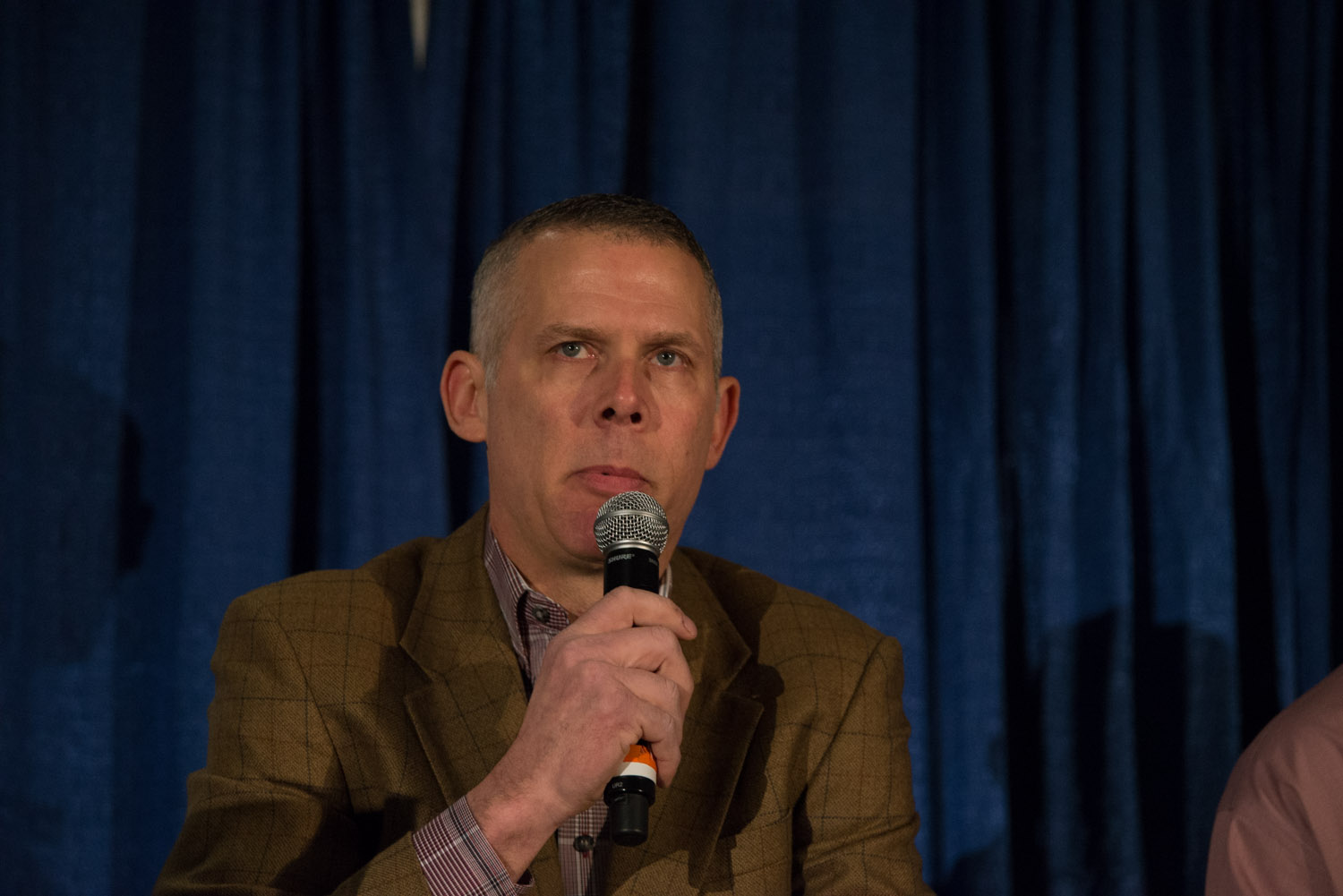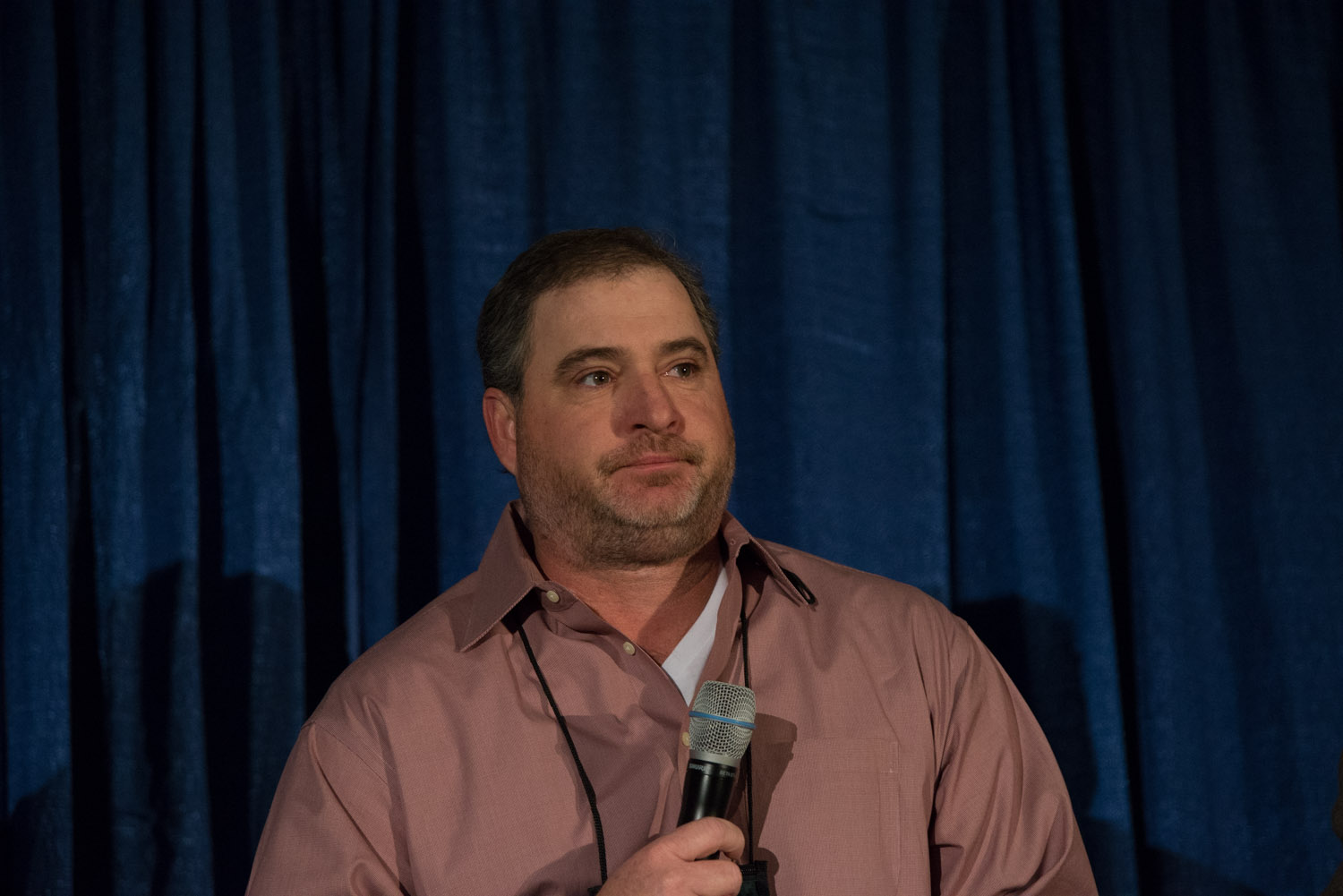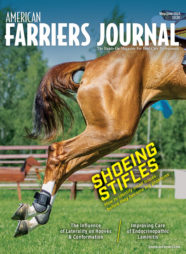Farriers often look for ways to boost a practice. Often, some ideas are simple and overlooked. The best source is other farriers who have picked them up along the way.
While at the 2015 International Hoof-Care Summit, Todd Allen of Vandergrift, Pa.; Matt Cooper of Cleveland, Texas; and David Nicholls of West Sussex, United Kingdom; shared their ideas for you to implement into your practice as soon as you get home. We covered 25 of their ideas in the April issue of American Farriers Journal (“25 Quick Tips For Improving A Practice,” American Farriers Journal, April 2015, page 74). Here, you will find 17 more tips to help improve your practice.

|
| Todd Allen of Vandergrift, Pa. |
Establish good vet/farrier relationships. “One of the best things you can do for your business is to have a good relationship with the vet. In my area, there is a vet who a lot of people know — I consider him an icon. He is a master at making relationships and helps everything go smooth in our business. If we have a problem, we call him. He never cuts on us. He’s very positive in everything he says and gives confidence to the owner,” says Allen. “If I have a questions on his shoeing recommendation or diagnosis, I’ll give him a call. If I don’t think he got all of the information from the horse owner, I’ll give him a call. Go around, meet with your vets, get good report with them. If you have a problem, don’t trash talk them to the client, just call them personally.”
Return phone calls. “That’s something that you’d think would be common sense, but I can’t tell you how many times I go to a barn for a new client who says, ‘I’ve called half a dozen farriers and you’re the only one who called me back,’ ” says Cooper. “The owner of a farrier supply shop shared a story with me. He said he had a farrier come in, an older gentleman, probably around 70, with a younger gentleman, his apprentice. He says, ‘I thought you retired.’ And the farrier says, ‘Well I did, but the money was too good. I really don’t shoe horses that well, but I communicate.’ Then the old farrier goes off and gets his supplies and the younger farrier says, ‘Even if he can’t make the visit, he returns the call and lets the people know that he can’t make it and he refers another farrier.’ ”
Ride with your peers. “Probably one of the best things you can do in your shoeing career is ride with people who might be a little bit more experienced than you. One thing that I’ve found is that the younger people are afraid to ask. They think they’re bothering you. People with more experience love for you to ask,” says Allen. “One of the only concerns or issues I have with ride alongs is when guys come up to me and ask to ride with me and then they don’t show up. They’re the ones really losing out, but I also lose time waiting for them to show up. We spend a lot of time traveling around with guys we respect. I’ve driven hours and hours to ride with a guy with a good reputation, but what you learn is invaluable.
“Sometimes, as the older guys, we have to ask the young people, ‘Hey, why don’t you hop in and ride with me today.’ We have to encourage them because they’re bashful. They think they’re imposing on you. So from either side, do not hesitate. Make this situation happen.”

|
| Matt Cooper of Cleveland, Texas |
Pay your bills. “We like to get paid,” says Cooper. “I get asked a lot about how do we get paid. Well you have to start by paying your bills. I tried to look up some information on what consumer debt is, and I can’t write that many zeros. It’s astronomical. It becomes a snowball effect. You don’t pay one, you put it off another month and another month, and before long you’re in a big hole. So pay your bills and pay them on time. Most of them have an interest charge so you end up paying a lot more than what you started paying.”
Don’t be prideful. “Ask for help,” Cooper says. “The International Hoof-Care Summit Program has a list of phone numbers for all of the speakers. I don’t think there’s one of us who wouldn’t pick up the phone and answer a question you might have. It’s a lot better to admit that you don’t know something and find the answer. Don’t guess. This is not a guessing game. You can find help.”
Utilize technology. “The downside to using a mobile phone to run your business is that it doesn’t have the computing power. The minimum for running your business should be a mobile phone, a laptop and a mobile printer,” says Nicholls. “The downside to tablets is when you’re standing there in the pouring rain and the freezing cold they don’t operate very well. Also, they have a lack of memory power and a lack of processing power to be able to operate a business effectively. I think that if you research it, you’ll end up with the same conclusion I did. Mobile technology is going to increasingly encroach on us, so go ahead and embrace it rather than try and shun it.”
Stay physically fit. “I’m not saying to go run a marathon, but after you get done for the day, try stretching or jog a little bit. It doesn’t take much,” says Cooper. “I just talked to a gentleman this morning who said he swam and ran before coming in this morning. I’m not going to do that, but I have three young girls who keep me going. They go run a lap and I run a lap with them. We’re in a physical job, but you have to look after your cardiovascular health too. Stay fit.”
Be a “why” guy. “Apparently my brain isn’t fully developed or hasn’t gained full capacity yet, because from the time I was 2 years old, I’ve been asking why,” says Allen. “I think you need to be a ‘why’ guy or a ‘why’ girl. It can come down to looking at the horse. You’re looking it over and trying to figure out what’s wrong with this horse and you need to ask why. Ask the owner, the barn help or other farriers. Ask them if you don’t know something or if you can’t figure something out. Being a why guy is one of the best things you can do. You need to ask a lot of whys through this whole journey.”
Show up on time. “Give yourself about a 30-minute window,” says Cooper. “We’re lucky today because we can just send texts if we’re on our way or if we’re going to be late. You never know if there’s going to be traffic or if horses are going to be added to the barn you’re at before you get there. There are horse owners that want to talk and that can take time that you didn’t expect. It’s really simple. Just let people know when you’re going to be there and show up on time. Even better, try to show up a little early.”

|
| David Nicholls of West Sussex, United Kingdom |
Help others on your way up. “You have ups and downs in your career,” says Nicholls. “I’ve had plenty of ups, but I’ve also had some crashing falls. Through being helpful on the way up and trying to be nice to everyone, I’ve always been staggered by the help and support I’ve received when I’ve been down. There have been a whole heap of people who have caught me and stopped me from hitting rock bottom. And they help me back up again. Just be polite to someone and saying good morning. Give your friend a call just to see how he is. Those things can mean an awful lot to people and then they realize you care and they’ll care for you too.”
Find opinion leaders. “So what’s an opinion leader? That’s someone who’s respected in your community and area who people go to for their opinion. They may not be a horse owner and they may not have anything to do with horses, but this is someone who everyone looks up to. We have a couple around me and I’m fortunate enough to know them,” says Cooper. “When you join clubs and volunteer, you will find these types of people. When somebody is in a bind or needs a service, they will go to those opinion leaders first, and they need to know your name.”
Send greeting cards. “Sending greeting cards can be a good marketing tool. When someone loses one of their treasured pets, one of their equine friends, send them a a bereavement card to sympathize with their loss,” says Nicholls. “Or send a ‘sorry you’re leaving’ card for a client who’s decided to utilize someone else’s farrier services instead of yours. Make people think that you did care and they’ll talk to other horse owners. If someone gives you a referral, send them a thank you card. All of those things are fantastic marketing tools that we don’t often realize the power of until you start doing it.”
Spend a minute now to save an hour later. “A young man rode with me one day, and he made a comment that stuck with me,” says Allen. “He said, ‘It’s close enough.’ He was willing to nail on a shoe that wasn’t quite right. He settled for complacency. I can’t stand that. Take your time. Even if you’ve nail that shoe on, pull it off and take it back to the anvil. If it’s not boxed the way you want, make that shoe the way you want it before you leave. Take one more trip to the anvil or grinder. Do whatever it takes. Do not settle for complacency. Take that extra minute because it might save you from losing a shoe or from having extra problems down the line. You’ll be a better horseshoer and you’ll be happier with yourself.”
Donate time to horse organizations, camps and events. “A few barns that I shoe at have camps in the summer and they always ask if I have time to help educate the groups a little bit,” says Allen. “I think it’s very important because they’re usually younger groups and this gives us the chance to educate them early on. One of the ways we can help horse organizations is to donate our time. It doesn’t matter if it’s a pony club, a 4H club or anything. People will appreciate what you do and you’ll be helping the industry around you.”
Never stop learning. “We attend clinics, we attend the International Hoof-Care Summit and we get the American Farrier Journal, but we have to go beyond that,” says Allen. “I’m sure everyone has a community college around them and a lot of us have internet access. They give courses in business that aren’t full semesters. They may be just a weekend or just a few nights a week. Go learn something different. Go take a business class. Go take an accounting class. I think that will help your business and broaden your knowledge from just nailing on a shoe or trimming a foot. Also, take customer service classes. Before I was a farrier, I was in the customer service industry and they used to send us to seminars where they teach you how to do customer service. That’s really what farriers are. We are service providers to our customers.”
Read something everyday. “I highly recommend you read the American Farriers Journal every day,” says Nicholls. “It’s a good place to start. I’ve found that after I finish lunch, I usually read something. Whether it’s just a few pages of a book or a magazine. After reading something, I find that I have a different mental attitude. Instead of just rushing off to the next appointment, taking five minutes or so gives you a break and I think you’ll find it changes your attitude in the afternoon. It will actually invigorate you.”
Keep your tools maintained. “Maintain your tools. That’s one of those things you should do in the evening when you get home or in the morning when you wake up. Spray your tools down and make sure your knives are sharp. It will speed up your work and it will make you look like a professional who knows what they’re doing,” says Cooper.
Read more advice in the article "25 Quick Tips for Improving a Practice"







Post a comment
Report Abusive Comment